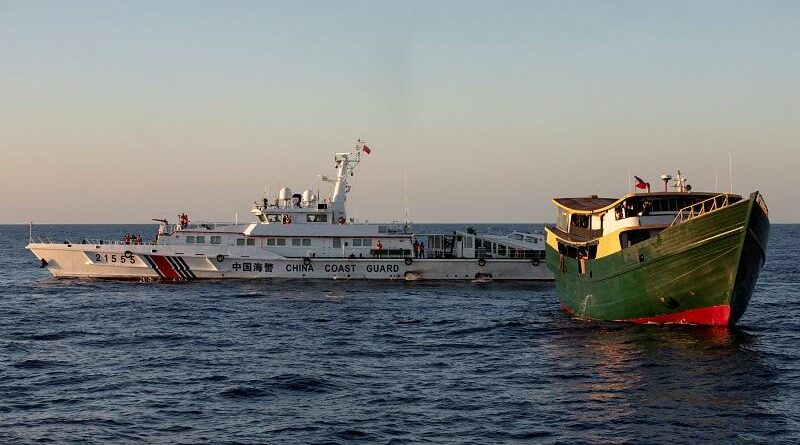DFA: China”s claim of historic rights to South China Sea ‘baseless and misleading”
The Department of Foreign Affairs on Sunday responded to China’s assertion of “historic rights” in the South China Sea, calling its claims “baseless and misleading.”
Last Thursday, Chinese foreign ministry spokesperson Wang Wenbin asserted China’s historic rights in what it calls “Nanhai Zhudao,” or “South China Sea Islands.”
“China has internal waters, territorial sea and contiguous zone, based on Nanhai Zhudao; China has exclusive economic zone and continental shelf, based on Nanhai Zhudao. And China has historic rights in the South China Sea,” he said.
“The above positions are consistent with relevant international law and practice. As early as in 1948, the Chinese government officially released the dotted line, which has been upheld by successive Chinese governments,” Wang added.
In a statement, DFA spokesperson Teresita Daza called this claim “baseless and misleading.”
“The Philippines has long had sovereignty and exercised administrative control over Bajo de Masinloc, as well as various features west of Palawan which now form the Kalayaan Island Group. These features appeared and were clearly identified in the administrative maps of the Philippines during the Spanish colonial period, including the 1734 Murillo Velarde Map of the Philippines,” she said.
Bajo de Masinloc is also known as Scarborough Shoal or Panatag Shoal. The Kalayaan Island Group, meanwhile, are part of the municipality of Kalayaan, Palawan and includes other features in the sea that are claimed by China, including Pag-asa Island and Ayungin Shoal. Both Bajo de Masinloc and the Kalayaan Island Group are in the West Philippine Sea—the part of the South China Sea within the Philippines’ exclusive economic zone.
“As has been settled by the 2016 Arbitral Award, China’s claims to historic rights, or other sovereign rights or jurisdiction beyond the limits of the maritime entitlements provided by the UN Convention on the Law of the Sea (UNCLOS), are without legal effect,” Daza added.
In 2016, an international tribunal ruled that China’s sweeping claims to nearly the entirety of the South China Sea had no legal basis. China has refused to recognize this ruling.
“The Philippines maintains a firm stand against misguided claims and irresponsible actions that violate Philippine sovereignty, sovereign rights, and jurisdiction in its own maritime domain. The Philippines has never used the South China Sea issue to heighten tensions, mislead the international community, or undermine peace and stability in the region,” Daza said.
“The Philippines urges China to reconsider its unfounded positions and claims.”
In his statement, Wang also accused the Philippines of “misleading the international community” and claimed that China has never laid claim to the entire South China Sea. In response, President Ferdinand “Bongbong” Marcos Jr. said that he “did not know of any instance where the Philippines has instigated anything, at any point, both verbally, or militarily, or diplomatically.”
”We did not begin all of these problems. All of these commotions were not caused by the Philippines. So I don’t know what they are referring to,” Marcos added.
China’s coast guard and maritime militia vessels have been conducting “dangerous maneuvers” against Philippine government agency vessels and civilian fishing boats in the West Philippine Sea for years.
Earlier this month, four people were injured after two China Coast Guard (CCG) vessels trained their water cannons at a boat on a resupply mission to BRP Sierra Madre in Ayungin Shoal. Two days later, several Chinese vessels blocked and harassed the Philippine Coast Guard’s BRP Malabrigo which had been on its way to Bajo de Masinloc.
Retired Supreme Court justice Antonio Carpio, a longtime advocate of the Philippines’ rights in the West Philippine Sea, called the territorial dispute an “intergenerational struggle” for Filipinos. “I do not see this dispute being resolved anytime soon,” he said. — BM, GMA Integrated News



